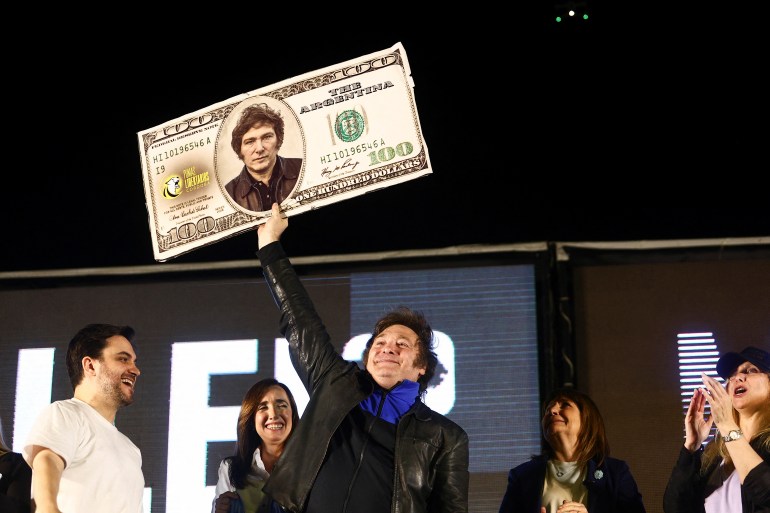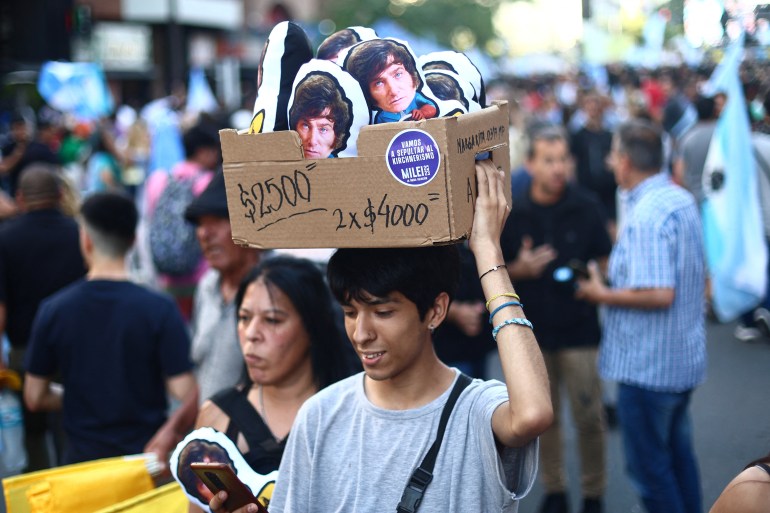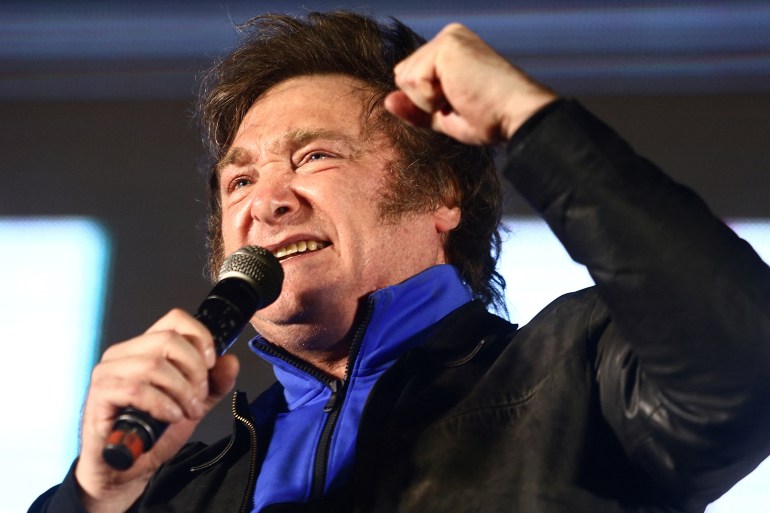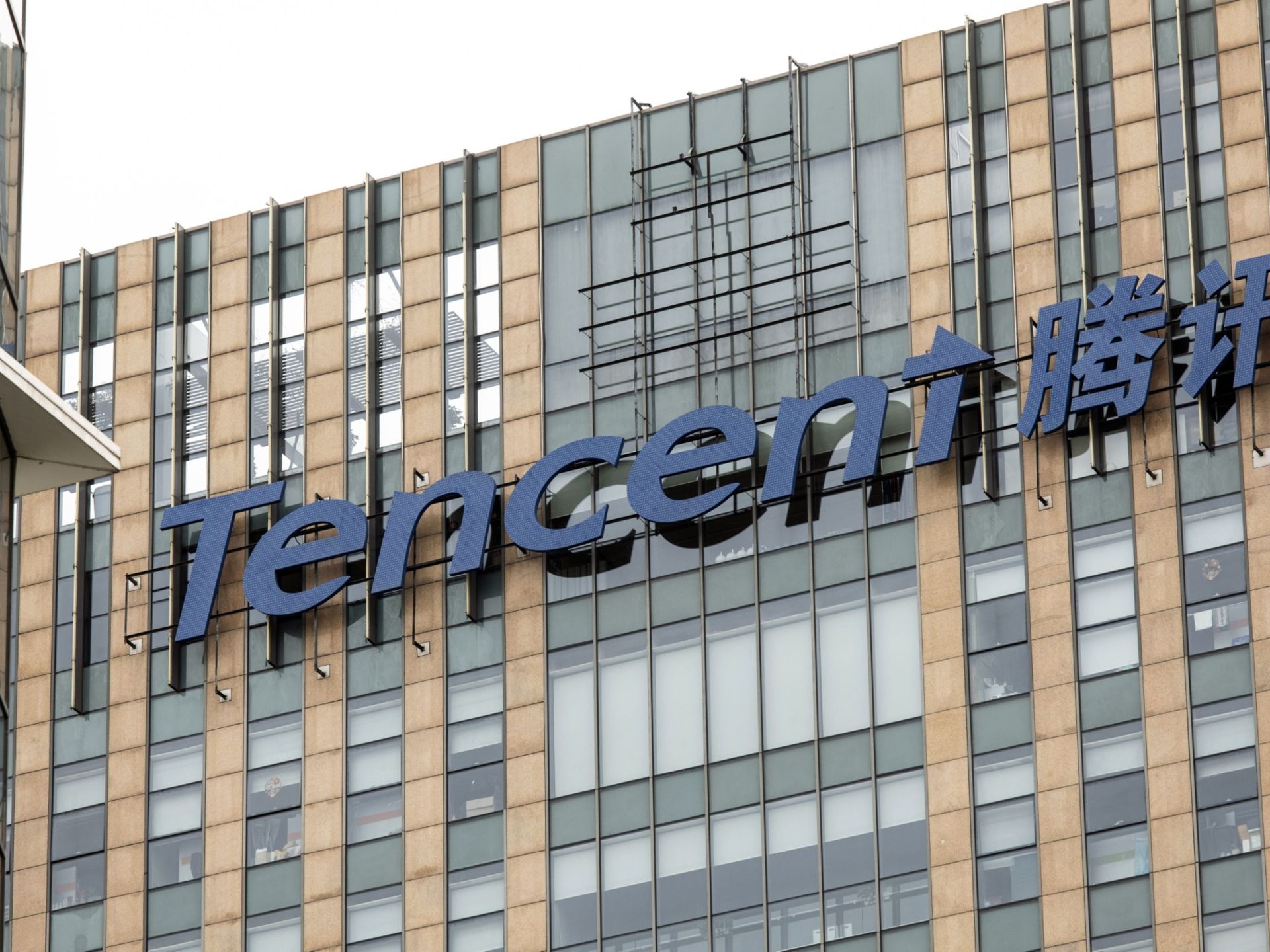
Buenos Aires, Argentina – David Urbani was 15 years old, barely out of high school, when he first met the future far-right presidential candidate Javier Miley.
Urbani, now studying economics at the National University of Mar del Plata, remembers surfing YouTube when he came across a series of educational videos that Milei had put together as part of his work at the time as an economist and professor in Buenos Aires.
“I think what moved me the most was the simple way he explained concepts,” said Urbani, 20, holding up an introductory economics book with Milei’s autograph. “The guy is an academic, not a politician.”
Although Milei is a relative newcomer to Argentine politics, he has nevertheless gained international fame as a minor candidate this year Presidential elections.
This Sunday he faces center-left Economy Minister Sergio Massa in a runoff election so close that polls show the two candidates in a dead heat.
Part of the fuel for Milei’s sudden political rise is the loyal following he has built among young, largely male voters like Urbani. Some are staunch libertarians. Others are merely curious and feeling unsatisfied with the political establishment.
But while pundits and opposition politicians lambast Milei for his radical right-wing policy proposals, this young generation of “Mileistas” say they are on board.
“I think we have to try, and that’s all,” said Ramiro Gómez, a 21-year-old computer scientist (IT) from Rosario province, about his decision to support Milei.
Milei was elected to the lower chamber of Argentina’s Congress in 2021 and was still in his first term when he launched his long-term presidential bid in this year’s race.
But he quickly caused a surprise. In August open elementary schoolhe shot to the top, win more votes than established figures such as Massa and the former security minister Patricia Bullrich.
Milei has remained a top performer ever since. He took the seat in the parliamentary elections in October second place behind Massa and secured one of two places in the runoff race.
Many experts attribute Milei’s sudden popularity to the emergency Argentina’s economy. The country is mired in a protracted economic crisis and inflation has exceeded 140 percent, causing the value of Argentina’s national currency, the peso, to fall.

To overcome the crisis, Milei promised Cuts in key ministries, charging for Argentina’s public health system, closing the central bank and adopting the US dollar as Argentina’s national currency.
He has also advocated and offered support for a mix of libertarian and conservative social positions that are causing a stir Ban abortion and legalization of organ sales. Popular targets of his sharply worded broadsides include women, the LGBTQ community and even Pope Francis, himself Argentine.
But while other right-wing populists such as former US President Donald Trump and Brazil’s Jair Bolsonaro have had difficulty winning over the younger generations, Milei is consistently at the top in surveys of voters between the ages of 16 and 35.
Mark P. Jones, a professor of Latin American studies at Rice University, attributes the difference to deep frustration over the crisis in Argentina and Milei’s image as a political outsider.
“When younger voters look at Milei, they see someone fighting the system and a rebel,” Jones said. “And I think one thing Milei has managed to do is effectively distance himself from his more conservative policies among younger voters.”

A “chainsaw” to the status quo
Milei’s most ardent supporters often connect via WhatsApp groups and on social media, where fan accounts feature silhouettes of the contestant’s signature sideburns and memes depict him in epic anime fights.
Milei’s eccentricities are central to his brand: He once fronted a Rolling Stones cover band and currently owns five cloned dogs, all named after right-wing economists.
Videos also went viral during the election showing Milei tearing off Post-It notes with the names of the ministries he wants to eliminate while shouting his catchphrase: “Long live damn freedom!”
Jones described Milei’s base as motivated less by ideology and more by desperation and resentment toward the traditional political establishment.
His support bloc, Jones explained, is largely made up of middle- and working-class voters in their late teens and 20s who are frustrated by having to struggle to maintain employment.
“Milei is her vehicle to use a chainsaw to effectively improve the status quo, but also to maybe try something different,” Jones said, referring to Milei’s embrace of the chainsaw as a campaign symbol.

Alan Quiroga, 28, who lives in a working-class suburb of Buenos Aires and drives his motorcycle for Uber, said he was first drawn to Milei when he saw the libertarian on television speaking passionately about the “Golden Age” of Argentina at the beginning of the 20th century.
“What he wants to implement is what they do in the United States, in Spain and in normal countries,” Quiroga said. “What we are experiencing here is heading towards Venezuela, Cuba.”
Although Milei’s proposal to adopt the US dollar is popular with many of his supporters, it faces strong opposition from the general public. A poll in September found that nearly 70 percent of Argentines rejected the idea.
This month, 170 Argentine economists also published an open letter predicting that a currency switch would lead to further inflation, mass unemployment and an “absurd” $400 billion increase in Argentina’s national debt.

“A good, crazy person”
But Milei’s appeal among young voters goes beyond his radicalism Economic plan. The candidate has tried to position himself as a critic of corruption among the political elite, which he calls “the caste.”
Senior members of Argentina’s main political parties have recently faced corruption allegations. Last year, for example, outgoing Vice President Cristina Fernandez was sentenced to six years in prison for fraud.
“The Javier Milei I like the most is the exuberant Javier Milei, the honest Javier Milei,” Urbani said. “It is the Javier Milei who gets angry when confronted with lies and dishonest people.”
Milei has a penchant for the dramatic and sometimes appears overwhelmed with emotion during his public speeches.
“A good, crazy person – that’s how I would describe him,” Quiroga said. “It comes from the heart. He can’t control it.”
But even some of Milei’s longtime supporters have doubts about his ability to maintain his anti-corruption reputation, especially as he expands his coalition to include the kind of establishment figures he often criticizes.

Former President Mauricio Macri has offered his support to Milei, as has Bullrich, his former conservative rival in the presidential campaign.
“When he unintentionally became involved in politics, he became part of the caste,” said Lucas González, a 28-year-old bookseller who said he still supports Milei.
Although Milei has built a strong movement, its survival will depend on the results of Sunday’s election and the performance of the economy in the coming months, said Noam Lupu, a political science professor at Vanderbilt University who researches Argentina.
“There will always be such a libertarian, pro-business vote in Argentina,” Lupu said. “But this kind of anti-establishment, anti-status quo and pro-disruption only succeeds if they continue to feel threatened by the status quo and the political class.”
Urbani disagrees. He believes Milei has sparked a significant political change among Argentina’s youth that will continue regardless of Sunday’s election results.
“The majority of young people are Milei voters, especially boys,” said Urbani. “What’s coming to Argentina is very good, because a lot of children have started to reckon with capitalist ideas, with economic concepts in their heads that they hadn’t talked about before.”






Recent Comments